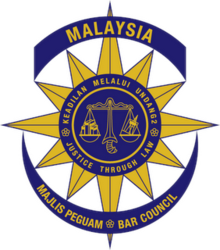A lawyer must be an exemplar of justice, a representative of the court and of the people who come before it. This is because the court expects passionate advocacy on behalf of the attorney’s client, but the client — and the public — expect the attorney to be justice in human form. This is fundamental to every lawyer’s training, something so basic that most lawyers learn it when taking their first classes.
The Bar Council has forgotten this lesson.
In recent months, the Bar Council has made a bit of a spectacle of itself, and removed any pretence that it is a neutral arbiter of the law. In so doing, it has cast real doubt on the profession’s ability to fairly and adequately represent their several clients in court, and done grave damage to the image lawyers have worked centuries to cultivate, and on which society relies.
It began with the Peaceful Assembly Act, the first part of Prime Minister Datuk Seri Najib Razak’s slate of reforms. That law was notable in the small rally held for Datuk Seri Anwar Ibrahim when his Sodomy II verdict was announced, a scene notable for a vibrant gathering and no police action; indeed, the police and Anwar’s subordinates set up a plan under the new law and were able to bring the rally to a peaceful conclusion.
It was also the law that shielded Bersih 3.0, until that rally was hijacked by Opposition politicians apparently determined to incite violence and make a spectacle for the cameras.
Before the law had even left Parliament, the Bar Council was on the march — literally — protesting the PAA as worse than its predecessor. That subsequent events showed this was not so did not stop them from adopting Pakatan Rakyat’s messaging wholesale.
More recently, the Bar Council has openly aided in Pakatan’s messaging on Bersih 3.0. Less than one-tenth of the entire Bar passed a resolution at a hastily-called extraordinary general meeting last week, condemning the police for using “excessive” and “indiscriminate” force to disperse Bersih 3.0 after protesters assaulted police and breached police barricades.
The Bar Council’s leadership has for some time trended toward Pakatan, as Dato’ Ambiga Sreenevasa’s tenure as President demonstrated. But matters have grown more politicised under the leadership of current President Lim Chee Wee, who has used the Bar Council’s megaphone as his personal sounding-board.
It is for this reason that the Bar Council’s recent, hasty defence that it is merely speaking out for the law and undefined ‘human rights,’ and not siding with any particular party, seems so hollow.
In any country that employs the English common law system in some way, lawyers rely on public trust for their work; if they are seen as partial or biased, or if they openly favour one political party over another, then they risk the perception that the law is stacked against certain litigants.
If there is no trust in lawyers, there is no trust in courts; if there is no trust in courts, there is no trust in the law; if there is no trust in the law, there is no trust in democracy and peaceful dispute resolution.
Imagine being a police officer charged with brutality during Bersih 3.0. You are certain that you did nothing wrong, but you are being prosecuted nevertheless, and so will appear in court. You know that the Government wishes to convict you, or you would not be on trial.
But if your lawyer reflexively believes Pakatan Rakyat propaganda, what chance do you have? Even if your lawyer reassures you that he will zealously argue on your behalf, do you believe him?
Does your family? Do your neighbours? Their families and neighbours? If you lose, do they believe a just system did its job fairly (if incorrectly)? Or do they believe there is no justice to be had?
By siding with Pakatan again and again in policy disputes; by threatening to march over Bersih; by demanding charges be brought against the police, the Bar Council is endangering the rakyat’s belief in the rule of law.
Trust in the rule of law is the glue that makes democratic governance possible. The Bar Council is actively and shamefully dissolving it, and defying their mandate in the process.

